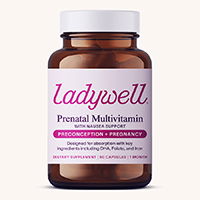Endometriosis is a condition that touches the lives of roughly 10% of women during their reproductive years, yet it often remains under the radar.
This elusive ailment can deeply affect your life, making it all the more important to recognize its symptoms early on.
Let's chat about the 20 signs of endometriosis you shouldn't overlook, aiming to equip you with the knowledge you need to take charge of your health.
Before we dive into the 20 signs of endometriosis, let's understand what endometriosis is and why knowing these signs matters.
What is Endometriosis? Let's Demystify It
Imagine the tissue that lines the inside of your uterus — that's the endometrium.
Now, picture this tissue growing outside the uterus, often affecting the pelvic organs. This can cause chronic inflammation and scar tissue.
The root cause of endometriosis isn't fully understood, but it's known to contribute significantly to fertility challenges and persistent pain for many women. Recognizing the signs early and seeking medical advice can make a huge difference in your quality of life.
The 20 Symptoms of Endometriosis You Need to Watch Out For
Did you know that everyone experiences endometriosis differently?
If you're experiencing any of these symptoms and are worried, don't hesitate to contact a medical professional for answers.
Here are the 20 symptoms of endometriosis to watch out for:
- Intense Menstrual Cramps. You might notice that your cramps are stronger than usual and don't go away with the typical pain relievers.
- Persistent Lower Back and Pelvic Pain. You may feel ongoing pain in your lower back and pelvis, which can get sharper during your menstrual cycle.
- Discomfort During Intimacy. Some discomfort or pain might occur during or after intimacy.
- Intestinal Discomfort. This includes discomfort during bowel movements or when urinating.
- Unusually Heavy or Long Periods. Your periods might be heavier or last longer than you're used to.
- Challenges with Fertility. Some women find out they have endometriosis when looking into fertility issues.
- Nausea and Tiredness. Feeling nauseous and unusually tired can often accompany menstrual periods.
- Bloating. This might feel like a noticeable swelling or puffiness in the stomach area, sometimes called "endo belly."
- Discomfort When Urinating During Periods. This can feel similar to a urinary tract infection.
- Digestive Issues. You might experience diarrhea or constipation, often related to your menstrual cycle.
- Leg Discomfort. Pain might extend down your thigh and legs.
- Chest Discomfort or Cough. Though rare, endometrial tissue can sometimes affect the lungs, causing these symptoms.
- Headaches or Migraines. These can be linked to changes in your hormone levels.
- Noticeable Menstrual Clots. You may observe larger or more frequent clots during your period than usual.
- Ongoing Fatigue. Even with rest, you might feel constantly tired.
- Mood Changes. Significant mood fluctuations can occur, particularly around the time of your menstrual cycle.
- Cravings or Low Blood Sugar. You might notice cravings, especially for sweets, or experience signs of low blood sugar.
- Dizziness. Episodes of feeling light-headed or dizzy can occur.
- Rare Leg Clots. While uncommon, it's possible to develop blood clots in the legs.
- Emotional Health Effects. Ongoing pain and hormonal shifts can influence your feelings, potentially leading to anxiety or depression.
Managing Symptoms: Tips and Support for Endometriosis
While endometriosis has no cure, symptom management is possible with medical treatments and lifestyle changes.
Here are three key strategies that can help you alleviate some of the 20 Symptoms of Endometriosis:
- Balanced Diet and Supplements. Maintaining a nutritious diet rich in fruits, vegetables, and omega-3 fatty acids can help reduce inflammation. Complement this with Ladywell’s Daily Hormone Balance Capsules, expertly formulated with a blend of adaptogens, functional mushrooms, vitamins, and amino acids. These supplements are designed to promote hormonal balance and address various symptoms such as mood swings, menstrual cramps, and hormonal breakouts.
- Regular Exercise and Stress Reduction. Doing gentle exercises like yoga and Pilates can relieve pain and improve mental well-being. You can also start practicing stress-reduction techniques such as mindfulness or deep breathing exercises, which can help manage stress, which may exacerbate symptoms.
- Pain Management and Regular Medical Check-ups. Utilize pain management strategies recommended by your healthcare provider, such as taking prescribed pain relievers and using heat therapy. Regular medical check-ups are also crucial to monitor the condition and adjust treatments as necessary.
For a comfortable solution, consider Sundaze Heated Shorts. These can be used on their own or alongside pain relievers, providing essential heat therapy to help alleviate your symptoms.
If any of the 20 symptoms of endometriosis start to disrupt your daily life or don't ease with typical pain remedies, it's crucial to talk to a healthcare provider.
Early action can help manage symptoms and prevent further complications. Be particularly vigilant if you experience severe pain, significant bleeding, or suspect fertility issues.
Take Charge of Your Health with Ladywell Supplements
Recognizing and addressing the 20 symptoms of endometriosis is crucial for your health and well-being. While managing this condition can be challenging, incorporating the right support can make a significant difference.
At Ladywell, we understand the complexities of endometriosis and offer specially formulated supplements to help manage its symptoms.
Our supplements are crafted with a blend of natural ingredients that target inflammation, pain, and hormonal imbalances associated with endometriosis.
By including our supplements in your daily regimen, you can provide your body with additional support to cope with the demands of this condition.
Explore our range of supplements at Ladywell and join a community that supports women through their unique health journeys.
Let us help you take a proactive step toward managing your symptoms and enhancing your quality of life.

















































